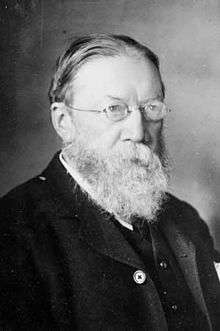William Henry Preece
| William Henry Preece | |
|---|---|
 William Henry Preece | |
| Born |
15 February 1834 Caernarfon, Gwynedd, Wales, United Kingdom |
| Died | 6 November 1913 (aged 79) |
| Nationality | British |
| Education | King's College London |
|
Engineering career | |
| Discipline | Civil, Electrical, |
| Institutions | British Association for the Advancement of Science (president, Section G), Institution of Civil Engineers (president), Institution of Electrical Engineers (president), Society of Telegraph Engineers (president) |
Sir William Henry Preece FRS (15 February 1834 – 6 November 1913) was a Welsh electrical engineer and inventor. Preece relied on experiments and physical reasoning in his life's work. Upon his retirement from the Post Office in 1899, Preece was made a Knight Commander of the Order of the Bath (KCB) in the 1899 Birthday Honours.[1]
Biography
Preece was born in Caernarfon (Gwynedd), Wales, Great Britain. He was educated at King's College School and King's College London. Preece studied at the Royal Institution in London (Great Britain) under Michael Faraday. He later was the consulting engineer for the Post Office (1870s). He became Engineer-in-Chief of the British General Post Office in 1892. He developed several improvements in railroad signaling system that increased railway safety. Preece and Oliver Lodge maintained a correspondence during this period. Upon Lodge's proposal of "loading coils" applied to submerged cables, Preece did not realise that "Earthing" would extend the distance and efficiency.
Telegraphy
In 1889 Preece assembled a group of men at Coniston Water in the Lake District in Cumberland and succeeded in transmitting and receiving Morse radio signals over a distance of about 1 mile (1.6 km) across water.[2]
Preece also developed a wireless telegraphy and telephony system in 1892. Preece developed a telephone system and implemented it in England. A similar telephone system was patented in the United States by Alexander Graham Bell in 1876. In 1885, Preece and Arthur West Heaviside (Oliver Heaviside's brother) experimented with parallel telegraph lines and an unwired telephone receiver, discovering radio induction (later identified with the effects of crosstalk).
Radio
In 1897, with Marconi radio experiments from Lavernock Point in south Wales to the island of Flatholm, became one of Marconi's most ardent supporters. He made various efforts to support Guglielmo Marconi in the wireless field. Preece gained financial assistance from the Post Office to help expand Marconi's work. Preece believed that the Earth’s magnetic field was critical in the propagation of radio waves over long distances.
He had a long-standing rivalry with Oliver Heaviside over his traditional ideas about electricity. It was derisively referred to as "the drain-pipe theory" by Heaviside, because Preece presented the analogy of electricity and water for thought experiments. Reportedly, he never understood James Clerk Maxwell's advances to "mathematical scientific theory" .
Preece once stated, conveying sentiments which were later made by Edwin Armstrong,
- True theory does not require the abstruse language of mathematics to make it clear and to render it acceptable [...] All that is solid and substantial in science and usefully applied in practice, have been made clear by relegating mathematic symbols to their proper store place --- the study. - Preece's inaugural speech as president of the Institution of Electrical Engineers in 1893
Preece served as president of the Institution of Civil Engineers between April 1898 and November 1899.[3]
References
- ↑ The Edinburgh Gazette: no. 11101. p. 589. 13 June 1899. Retrieved 3 April 2015.
- ↑ South African Military History Society - Journal - WIRELESS TELEGRAPHY DURING THE ANGLO-BOER WAR OF 1899-1902 at rapidttp.co.za
- ↑ Watson, Garth (1988), The Civils, London: Thomas Telford Ltd, p. 252, ISBN 0-7277-0392-7
External links
| Wikisource has original works written by or about: William Henry Preece |
- Russell Naughton, "Adventures in CyberSound: Preece, William Henry".
- "100 Welsh Heroes / 100 Arwyr Cymru", 73. Sir William Henry Preece, Groundbreakers. Culturenet Cymru, 2004.
- Oil on canvas painting by Beatrice Bright of Sir William Preece
| Professional and academic associations | ||
|---|---|---|
| Preceded by John Wolfe-Barry |
President of the Institution of Civil Engineers April 1898 – November 1899 |
Succeeded by Douglas Fox |